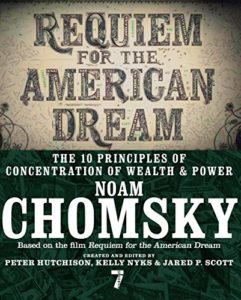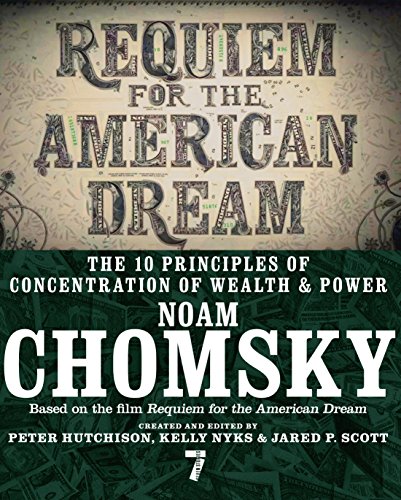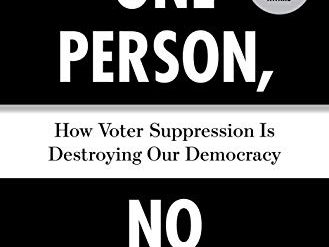
For decades, economic scholars have commented on the dangers inherent in the growing concentration of wealth in Western society. Though misleadingly referred to as “income inequality” in the new media, this critically important topic actively entered public debate in 2011 with Occupy Wall Street. Nobel Prize-winning economists Joseph Stiglitz and Paul Krugman and others added to the debate in the years that followed. Then, Senator Bernie Sanders flogged the issue at every opportunity in his presidential race in 2016, giving the issue further prominence. If there’s anyone alive and alert in America today who isn’t aware that the concentration of wealth is a growing problem for our society, I’d be surprised.
Few contemporary American observers have a clearer-headed understanding of the issue and its causes than Noam Chomsky. Chomsky, born in 1928, is widely regarded as the father of modern linguistics and one of the founders of the field of cognitive science. He’s also well known—some might say notorious—as an activist and social commentator. He has written dozens of books on the technical aspects of his academic work, and even more on politics. But his latest, Requiem for the American Dream: The 10 Principles of Concentration of Wealth & Power, is not a book he wrote.
Requiem for the American Dream: The 10 Principles of Concentration of Wealth & Power by Noam Chomsky ★★★★☆
Instead, the book was distilled from a 2015 film of the same name, a documentary patched together using interviews filmed over four years with Chomsky. Unlike the books he has written, most of which are slow going and many (the texts on linguistics, impenetrable), Requiem consists entirely of transcriptions from the spoken word. The style is conversational and uses only a bare minimum of jargon. It’s a quick read, and an enlightening one.
As Chomsky notes, “Power has become so concentrated that not only are the banks ‘too big to fail,’ but as one economist put it, they are also ‘too big to jail.'” Given our experience over the past decade, it would be difficult to argue with that. And anyone who closely follows events in American society today would say the same about this observation by Chomsky: “the rich and powerful, they don’t want a capitalist system. They want to be able to run to the ‘nanny state’ as soon as they’re in trouble, and get bailed out by the taxpayer.” If the American people fully understood how much tax money is funneled to corporations as subsidies, and how much the tax code has been distorted to favor them and their shareholders, they would storm Washington DC by the millions.
Ten “principles” that explain the concentration of wealth
In Requiem, Chomsky presents ten “principles” that together explain how the massive concentration of wealth in America today has come about. (His analysis applies to other wealthy countries as well, but it fits the U.S. best.) His argument is best summed up as what he calls a vicious circle: “Concentration of wealth yields concentration of power, particularly so as the cost of elections skyrockets, which forces the political parties even more deeply into the pockets of major corporations.”
The 10 principles underlying this reality, as Chomsky sees them, are:
- Reduce Democracy
- Shape Ideology
- Redesign the Economy
- Shift the Burden
- Attack Solidarity
- Run the Regulators
- Engineer Elections
- Keep the Rabble in Line
- Manufacture Consent
- Marginalize the Population
I’ve never seen a more comprehensive or economical explanation of how wealth has come to be so concentrated in so few hands in the U.S. today. Most of these principles are self-evident at a glance. Only two may require explanation. Chomsky uses the word “solidarity” as a synonym for empathy, caring for others, or “concern for your fellow man,” to cite another archaic expression. His Principle #8, “Keep the Rabble in Line,” refers to the coordinated 45-year effort by Big Business and Right-Wing ideologues to destroy the labor movement.
Adding depth to Chomsky’s message
The editors of Requiem—Peter Hutchison, Kelly Nyks, and Jared P. Scott—have interspersed short passages from other sources among the 10 Principles. The sources range over the centuries: from Aristotle and James Madison to Harry Truman and Martin Luther King Jr. These short excerpts from classic documents, speeches, press reports, and social commentaries add depth to the book’s presentation and enhance understanding of Chomsky’s message.
Chomsky’s views have often been regarded as extreme. Certainly, he is vilified by commentators and scholars on the Right. But if you read Requiem for the American Dream, I think you’ll find his reading of history is accurate, his logic is sound, and his view of America today is—sadly—right on target.
For related reading
Like to read books about politics and current affairs? Check out Top 10 nonfiction books about politics.
If you enjoy reading nonfiction in general, you might also enjoy:
- Science explained in 10 excellent popular books
- Great biographies I’ve reviewed: my 10 favorites
- My 10 favorite books about business history
And you can always find my most popular reviews, and the most recent ones, on the Home Page.


























